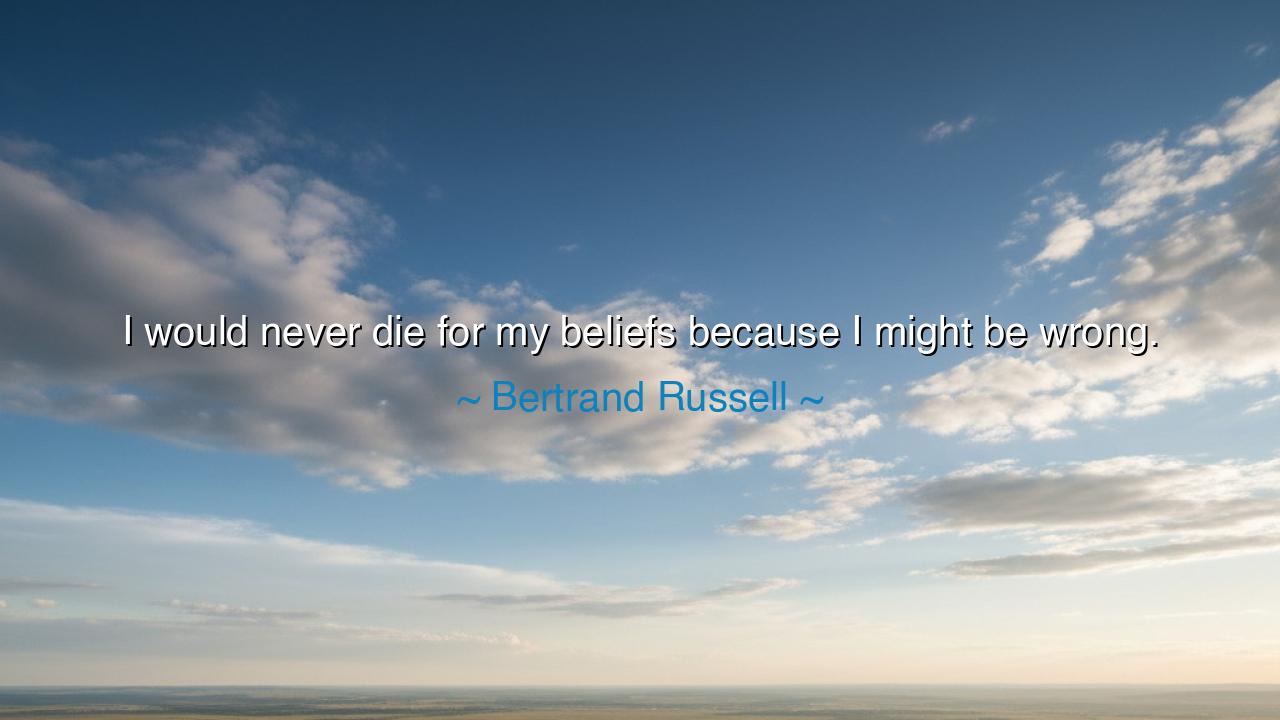
I would never die for my beliefs because I might be wrong.






"I would never die for my beliefs because I might be wrong." – Bertrand Russell
In the age-old struggle between conviction and humility, Bertrand Russell's words pierce like a clarion call to the soul. He reminds us that belief—however strongly held—is a human construct, subject to the limitations of the mind. It is this profound understanding of human fallibility that separates wisdom from zealotry. For to die for one's beliefs is a courageous act, but it also carries the risk of entombing oneself in error, a fate no noble soul would seek willingly. There is, in this quote, a plea for balance—a warning against the dangers of unwavering certainty. Certainty, that grand illusion which blinds us to the ever-changing nature of truth, is the very thing that Russell warns against.
In the fire of passion and the heat of conviction, many have been driven to extremes, sacrificing their lives for causes they believed to be righteous. The Crusades stand as a tragic testament to this—a time when men, blinded by religious fervor, took up arms in the name of a cause they considered unassailable. Yet, as history unfolds, the price of their steadfastness is revealed to be one of bloodshed and misguided judgment. They fought to the death, for what they thought was truth. Yet, how often have these truths shifted, leaving the fallen with no way to argue their cause, their beliefs rendered irrelevant in the passage of time?
The lesson here is not that all belief is to be doubted, but rather that belief should never be a shield against the searching light of doubt. Russell, a philosopher and mathematician, embraced the importance of questioning—of challenging even the things most sacred. Philosophy, at its core, is the pursuit of wisdom through reason, and reason demands an openness to correction. A belief, like a ship, should not sail the seas of life with sails too tight. It must allow for the wind of new understanding to shift its course, lest it break upon the rocks of arrogance.
Consider the story of Socrates, the ancient philosopher who lived in the service of truth. He, too, died for his beliefs—yet, unlike the zealots who died in pursuit of narrow, unchanging dogma, Socrates died in pursuit of questioning itself. He willingly drank the hemlock, not because he was certain of his beliefs but because he had come to realize the importance of never ceasing to question, of acknowledging that one could be wrong. His death, therefore, was not a martyrdom of mindless certainty but of a humble, heroic search for truth.
Russell’s quote speaks not just of intellectual humility but of the danger of blind conviction. Throughout history, we see leaders, kings, and revolutionaries who perished because they believed their cause to be above reproach. One of the most tragic examples can be found in the life of Robespierre, the leader of the French Revolution, who, in his unwavering belief in the righteousness of his cause, led his nation into a Reign of Terror. Ultimately, it was his own blind adherence to his principles that led to his downfall, as he was executed by those who once revered him.
The lesson we must take from Russell’s words is clear: believe with courage, but always with the understanding that your beliefs might be wrong. To be willing to die for a belief is to risk dying for something that may never have been true. Humility—the quiet acknowledgment that we do not know everything—is the bedrock of wisdom. We must carry our beliefs lightly, testing them against the winds of experience and debate, not clinging to them as though they are sacred relics to be preserved at all costs.
As you walk your own path, remember the words of Russell: Never die for a belief, for in doing so, you close the door on the possibility of growth. Instead, let your beliefs be your guide, but let them be shaped by the voices of others, by the lessons of history, and by the light of constant reflection. In this way, you will remain both true to your convictions and open to the possibility that, just perhaps, you might be wrong. For in this very openness lies the wisdom that can shape the future, a future where no belief is too sacred to question, and no life too precious to sacrifice in its name.






AAdministratorAdministrator
Welcome, honored guests. Please leave a comment, we will respond soon